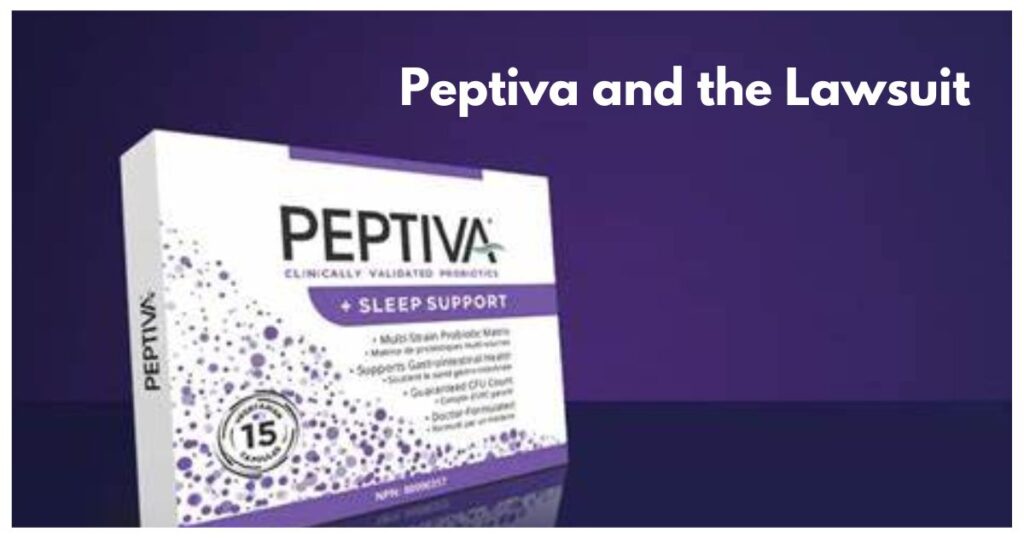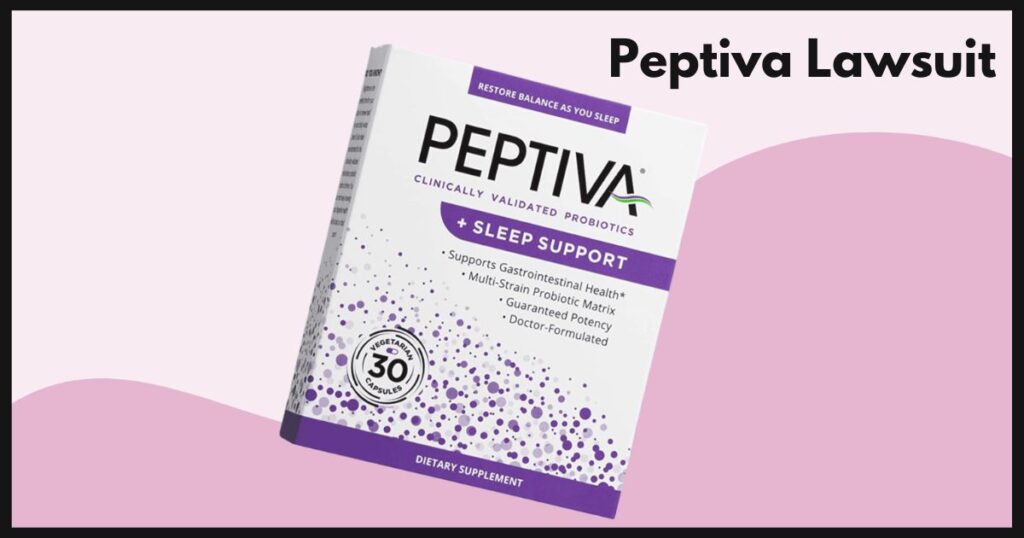The Peptiva lawsuit has raised significant concerns among consumers and within the supplement industry. Peptiva is a well-known brand in the dietary supplement market and is now facing legal challenges that have caught the attention of many who rely on these products for their health and well-being.
This article will explore the impact of the lawsuit on consumers, including potential health risks and financial implications. Additionally, we’ll examine how this case is influencing the supplement industry as a whole, from shifts in market trends to possible regulatory changes.
What are Peptiva Lawsuit?
The Peptiva lawsuit has sent shockwaves through the wellness industry, leaving consumers scratching their heads and supplement companies on high alert. This legal battle revolves around allegations of false advertising and deceptive marketing practices by Peptiva, a popular dietary supplement brand.
The lawsuit claims that Peptiva made exaggerated claims about the effectiveness of its probiotic products, potentially misleading thousands of customers who were seeking improved digestive health and better sleep.
This case isn’t just about one company’s misstep; it’s a stark reminder of the importance of advertising integrity and product transparency in the health and wellness sector. As the legal action unfolds, it raises crucial questions about how supplement companies market their products.
It also makes consumers question what they can really expect from the supplements they purchase. The Peptiva lawsuit is more than just a courtroom drama it’s a wake-up call for an industry that often operates in a gray area between health claims and scientific reality.
The Ripple Effect
The fallout from the Peptiva lawsuit is already rippling through the supplement world. Other companies are taking a hard look at their own marketing materials, worried they might be next in the legal crosshairs.
Meanwhile, consumers are becoming more skeptical, questioning the trustworthiness of health products they once took at face value. This newfound wariness could reshape the landscape of the wellness industry, pushing for greater transparency and more rigorous standards of proof for health benefits claims.
What is Peptiva? A Brief Overview

Peptiva burst onto the scene as a promising solution for those struggling with gut issues and sleep problems. The company’s flagship products combine probiotics with sleep-enhancing ingredients, promising a two-for-one deal: better digestive health and more restful nights.
With sleek packaging and compelling marketing, Peptiva quickly gained a following among health-conscious consumers looking for natural ways to improve their wellbeing. The brand’s rise to popularity wasn’t just about clever advertising, though. Peptiva tapped into a growing interest in the microbiome and its impact on overall health.
They positioned their products as cutting-edge formulations backed by science, appealing to those who wanted evidence-based solutions to their health concerns. This approach helped Peptiva stand out in a crowded market of dietary supplements and establish itself as a trusted name in wellness products.
The Promise vs. Reality
Peptiva’s marketing painted a rosy picture of effortless health improvements. Their ads suggested that taking their supplements could lead to significant boosts in digestive function and sleep quality, often implying results comparable to prescription medications.
However, as more consumers tried the product, a gap began to emerge between these promised benefits and the actual experiences of users. This discrepancy is at the heart of the current lawsuit, with plaintiffs arguing that Peptiva’s claims were more fiction than fact.
The Nature of the Lawsuit
The legal battle against Peptiva centers on allegations of misleading claims and false advertising. Plaintiffs argue that the company overstated the effectiveness of its products, leading consumers to believe they were purchasing a near-miraculous solution to their health issues.
The lawsuit contends that Peptiva’s marketing materials made bold statements about improved gut health, better sleep, and overall wellness that weren’t adequately supported by scientific evidence.
What sets this legal dispute apart is its focus on the nuanced language used in supplement advertising. The case isn’t just about outright false statements, but also about the implications and suggestions made in Peptiva’s marketing.
This includes claims about the potency of their probiotic strains, the speed at which consumers might see results, and the overall impact on health. The lawsuit argues that these claims crossed the line from permissible “puffery” into the realm of deceptive advertising, potentially violating consumer protection laws.
Recommended Blog: Blind Frog Ranch Lawsuit Update: Navigating Legal Entanglements
Key Allegations Against Peptiva
The court case against Peptiva is built on several key allegations that strike at the heart of the company’s marketing strategy. First and foremost, the plaintiffs claim that Peptiva engaged in deceptive marketing by exaggerating the benefits of their products.
They argue that the company made unsubstantiated claims about the ability of their supplements to significantly improve digestive issues and sleep quality, without sufficient scientific backing.
Another major allegation focuses on Peptiva’s product transparency, or lack thereof. The lawsuit contends that the company failed to adequately disclose the potential side effects and limitations of their supplements.
This alleged lack of transparency, the plaintiffs argue, left consumers in the dark about important information that could have influenced their purchasing decisions. The case also raises questions about Peptiva’s ingredient disclosure practices, suggesting that the company may not have been fully forthcoming about the exact composition and potency of their products.
Timeline of Events Leading to the Lawsuit
The road to the Peptiva lawsuit was paved with a series of events that gradually eroded consumer confidence in the brand. It all started with a trickle of complaints on online forums and review sites, where customers began sharing stories of underwhelming results and unexpected side effects.
As these anecdotes multiplied, consumer advocacy groups took notice, launching investigations into Peptiva’s marketing claims and product efficacy. The situation escalated when several high-profile health bloggers and influencers publicly questioned Peptiva’s claims, bringing wider attention to the growing controversy.
This increased scrutiny led to more formal complaints being filed with regulatory bodies, including the Federal Trade Commission (FTC). The mounting pressure led a group of dissatisfied customers to file a class-action lawsuit against Peptiva.
They allege false advertising and violations of consumer protection laws. This legal action marked the beginning of a protracted battle that would soon capture national attention and send ripples through the entire supplement industry.
Parties Involved in the Legal Battle
The Peptiva lawsuit involves a complex web of parties, each with their own stakes in the outcome. At the forefront are the plaintiffs, a group of consumers who purchased Peptiva products based on the company’s marketing claims.
These individuals allege that they were misled by Peptiva’s advertising and did not experience the benefits they were promised. They’re seeking compensation for their purchases and want to see changes in how Peptiva markets its products.
On the other side of the courtroom, we have Peptiva and its parent company, along with their team of lawyers. They’re fighting to defend their marketing practices and maintain their position in the competitive wellness products market.
Also involved are various consumer protection agencies and regulatory bodies, who are closely monitoring the case for potential violations of advertising standards and consumer rights.
Expert witnesses, including scientists and marketing specialists, are being called upon to testify about the validity of Peptiva’s claims and the impact of their advertising on consumers. This diverse cast of characters underscores the far-reaching implications of the lawsuit for both the supplement industry and consumer rights.
Legal Grounds for the Lawsuit

The legal foundation of the Peptiva lawsuit rests on several key areas of consumer protection law. The primary argument centers on alleged violations of false advertising regulations, particularly those enforced by the Federal Trade Commission (FTC).
These laws prohibit companies from making deceptive or unsubstantiated claims about their products, especially when it comes to health benefits. The plaintiffs argue that Peptiva crossed this line by overstating the effectiveness of their supplements without adequate scientific backing.
Another crucial aspect of the legal case involves state-specific consumer protection laws, which can vary in their scope and stringency. These laws often provide additional safeguards against deceptive marketing practices and may offer more avenues for consumer redress.
The lawsuit also touches on issues of product labeling and ingredient disclosure, alleging that Peptiva may have failed to provide complete and accurate information about their supplements.
This multifaceted legal approach reflects the complexity of regulating the supplement industry and highlights the challenges consumers face in navigating health product claims.
Impact on Peptiva’s Reputation and Market
The lawsuit has severely affected Peptiva’s reputation and market standing. As news of the legal action spread, consumer trust in the brand diminished, resulting in a drop in sales and prompting retailers and distributors to reconsider their partnerships.
The case has also ignited debates in the health and wellness community about the ethics of supplement marketing, increasing pressure on Peptiva to restore its credibility. The outcome of the lawsuit could shape Peptiva’s future in the competitive supplement industry, with lasting effects on its brand image and customer loyalty.
Consumer Reactions and Concerns
The Peptiva lawsuit has stirred up a whirlwind of emotions among consumers. Many feel betrayed, having put their faith and their money into products they believed would significantly improve their health.
Online forums and social media platforms are buzzing with discussions about personal experiences with Peptiva, ranging from disappointment to anger. Some users report feeling misled about the potential benefits, while others express concern about possible side effects they weren’t adequately warned about.
This wave of consumer discontent goes beyond just Peptiva users. The lawsuit has sparked a broader conversation about trust in the supplement industry as a whole. People are questioning how they can verify the claims made by health product companies and what standards these firms should be held to.
There’s a growing demand for more transparency in marketing and a push for stricter regulatory standards. Many consumers are now approaching all supplement claims with a healthy dose of skepticism, signaling a potential shift in how the public interacts with the wellness industry.
Current Status of the Lawsuit

As of now, the Peptiva lawsuit is still in its early stages, with both sides gearing up for what could be a lengthy legal battle. The case is currently in the discovery phase, where each party is gathering evidence to support their arguments.
Peptiva’s legal team is working to refute the allegations, while the plaintiffs’ attorneys are compiling consumer testimonies and expert opinions to strengthen their case. The court has yet to make any definitive rulings on the key issues at hand.
The lawsuit proceedings have attracted significant attention from both the media and the supplement industry. Legal experts are closely watching the case, as its outcome could set important precedents for how supplement companies advertise their products.
While there have been rumors of settlement talks, neither side has publicly indicated a willingness to resolve the matter out of court. As the case progresses, it continues to shine a spotlight on issues of consumer protection and marketing ethics in the wellness industry, keeping both Peptiva and its customers in a state of uncertainty.
Potential Legal Outcomes and Implications
The potential outcomes of the Peptiva lawsuit could range from a complete dismissal of the case to a landmark judgment against the company. If the court rules in favor of the plaintiffs, Peptiva could be forced to pay substantial damages, potentially in the form of refunds to customers or fines.
Such a verdict might also require the company to significantly alter its marketing practices, setting a new standard for transparency in the supplement industry. On the other hand, if Peptiva successfully defends itself, it could vindicate the company’s marketing approach and potentially discourage similar lawsuits in the future.
However, even a legal victory might not fully restore consumer trust. Regardless of the outcome, this case is likely to have far-reaching implications for how dietary supplements are advertised and regulated.
It could lead to stricter enforcement of existing rules or even new legislation aimed at protecting consumers from misleading claims in the wellness industry. The verdict could also influence how other companies in the sector approach their marketing strategies, potentially ushering in a new era of caution and increased transparency in health product advertising.
How the Lawsuit Affects Peptiva Users
For current Peptiva users, the lawsuit raises a host of concerns and questions. Many are left wondering about the safety and efficacy of the products they’ve been taking, potentially for months or even years.
Some users report feeling anxious about potential health risks they might have been exposed to, especially if they relied on Peptiva as part of their health regimen. Others express frustration at the possibility that they’ve been spending money on products that may not deliver the promised benefits.
The lawsuit has also created practical challenges for Peptiva customers. Some retailers have pulled the products from their shelves, making it difficult for regular users to continue their supplement routine. Additionally, there’s uncertainty about whether insurance companies will continue to cover Peptiva products or if consumers might be eligible for refunds.
This situation has left many users in limbo, unsure whether to continue using the supplements they have or to seek out alternatives. The emotional toll is significant, with many feeling a sense of betrayal and loss of trust in a brand they once relied on for their wellness needs.
Recommended Blog: Isotonix Lawsuit : A Legal Battle With Allegations and FDA Warning
Advice for Current and Potential Peptiva Users
If you’re currently using Peptiva products, it’s important to approach the situation calmly and rationally. First and foremost, consult with your healthcare provider about whether you should continue using the supplements.
They can offer personalized advice based on your health needs and help you weigh the potential risks and benefits. Keep a close eye on any changes in your health and report any concerns to your doctor immediately.
For those considering trying Peptiva or similar products, the lawsuit serves as a reminder to do thorough research before starting any new supplement regimen. Look for products with clear, scientifically-backed claims and transparent ingredient lists. Don’t hesitate to ask questions about the evidence supporting a product’s benefits.
Remember, no supplement is a magic bullet for health issues. A balanced diet, regular exercise, and good sleep habits are the foundation of wellness. Stay informed about the progress of the lawsuit and any regulatory changes it might spark in the supplement industry. Your health is too important to leave to chance or unverified claims.
Looking Ahead: What’s Next for Peptiva and the Lawsuit?

The future for Peptiva and the outcome of the lawsuit remain uncertain, but several scenarios are possible. Peptiva might choose to settle the case out of court to avoid prolonged negative publicity.
This could involve financial compensation for affected consumers and agreements to change their marketing practices. Alternatively, if the case goes to trial, it could set important legal precedents for the entire supplement industry, potentially leading to stricter regulations and enforcement.
Regardless of the legal outcome, Peptiva will likely need to rebuild its brand image and regain consumer trust. This could involve increased transparency in their marketing, more rigorous scientific testing of their products, and clearer communication about the realistic expectations for their supplements.
The broader supplement industry is watching closely, with many companies already starting to reevaluate their own marketing strategies to avoid similar legal challenges. In the long term, this case could catalyze a shift towards more ethical advertising and greater product transparency across the wellness sector, ultimately benefiting consumers seeking reliable health solutions.
Conclusion
The Peptiva lawsuit serves as a stark reminder of the complexities and challenges in the dietary supplement industry. It highlights the delicate balance between marketing enthusiasm and scientific accuracy, as well as the crucial role of consumer protection in the wellness sector. While the legal battle is far from over, its impact is already being felt, reshaping consumer expectations and industry practices.
As we move forward, this case underscores the need for greater transparency, more rigorous scientific backing for health claims, and clearer communication between supplement companies and consumers.
It’s a call to action for both the industry to raise its standards and for consumers to approach health products with informed skepticism. Ultimately, the Peptiva lawsuit may well be remembered as a turning point, ushering in a new era of accountability and trust in the world of dietary supplements.
FAQs About the Peptiva Lawsuit
What exactly is Peptiva being sued for?
Peptiva is facing legal action for alleged false advertising and deceptive marketing practices regarding their probiotic supplements.
Can I still buy Peptiva products during the lawsuit?
While the lawsuit is ongoing, Peptiva products may still be available, but some retailers might have removed them from their shelves.
How do I know if I’m eligible to join the lawsuit?
If you’ve purchased Peptiva products, you might be eligible. Consult with a legal professional or visit the official lawsuit website for more information.
What should I do if I’ve experienced side effects from Peptiva?
Report any side effects to your healthcare provider immediately and consider documenting your experience for potential legal purposes.
How long is the lawsuit expected to last?
Legal proceedings can be lengthy. The duration will depend on various factors, including potential settlements or court decisions.
Will Peptiva have to change its product formulation?
This depends on the lawsuit’s outcome. If required, Peptiva might need to alter its formulation or labeling practices.
Are other probiotic supplements facing similar legal challenges?
While the Peptiva case is high-profile, it’s possible that other supplement companies could face similar scrutiny in the future.
How can I verify the claims made by supplement companies?
Look for peer-reviewed scientific studies, consult healthcare professionals, and check reputable health information websites.
What regulatory changes might come from this lawsuit?
The case could lead to stricter advertising regulations or more rigorous testing requirements for dietary supplements.
Where can I find updates on the Peptiva lawsuit?
Check official court records, reputable news sources, or the websites of law firms involved in the case for the latest updates.

